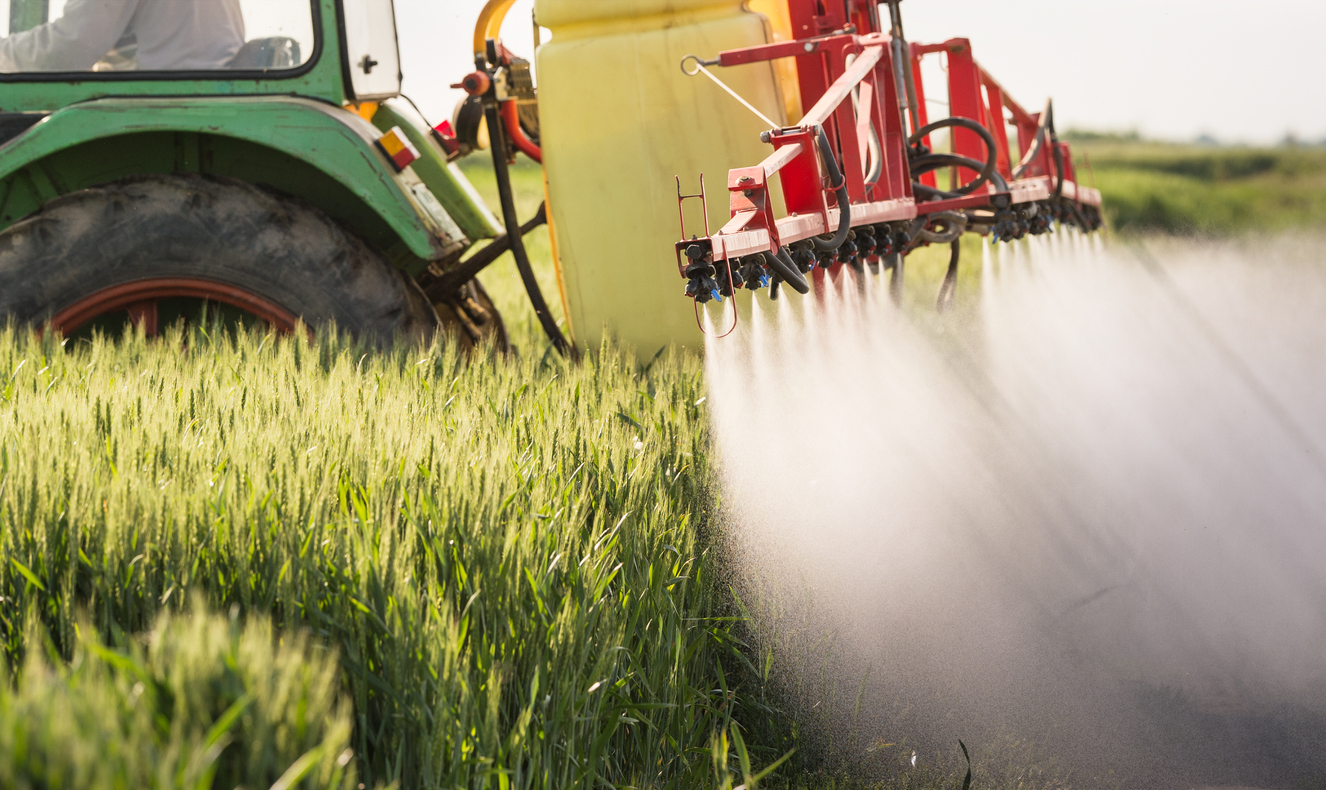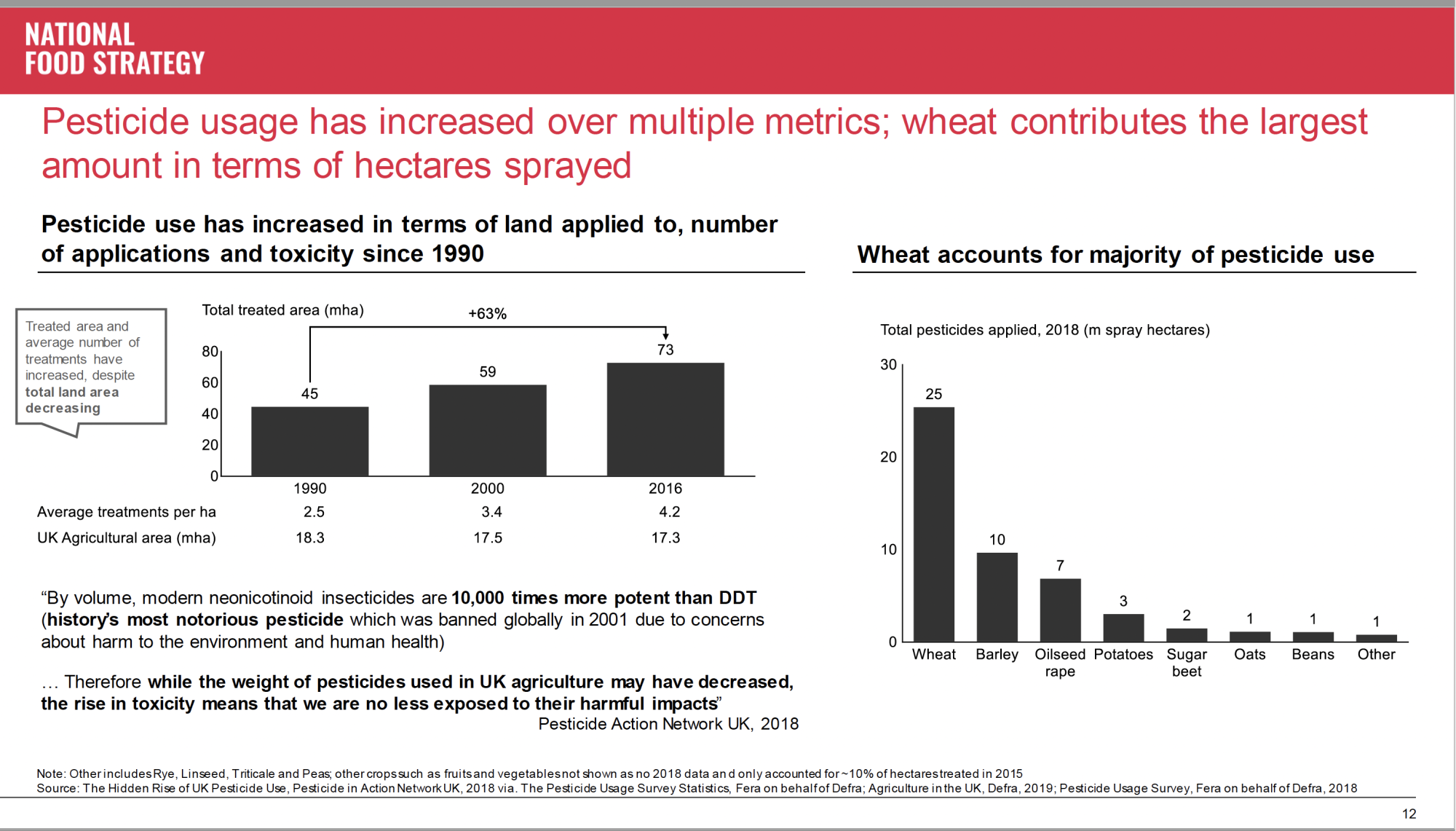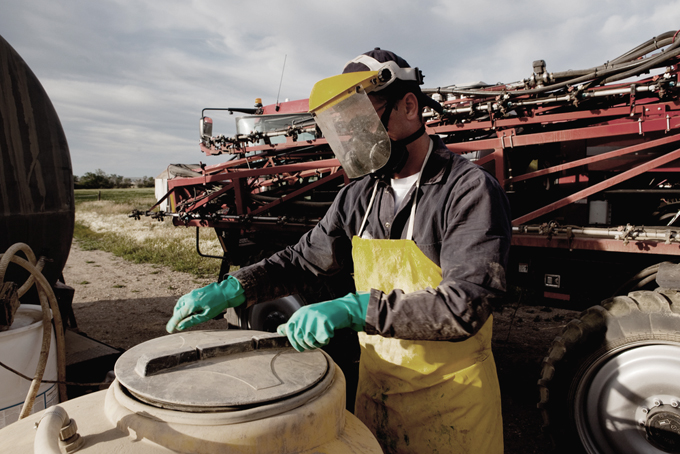I was asked not long ago why I used organic flour to make sourdough. One of the key reasons I that I am committed to using organic flour in sourdough is because the long term implications of ingesting Glysophate in our bread are not yet understood, but I am willing to bet that you would be shocked that Glysophate is sprayed on over two thirds of UK wheat as a pre-harvest weedkillers and used to kill the crop essentially to ripen it faster. The residue is in the grain we mill into flour and it is in our bread.

So What is Glysophate ?
Glyphosate is a broad spectrum herbicide used extensively in farming, but you might recognise it as the weed management of public spaces such as parks and other urban areas to kill weed. It is available for use to the domestic market. Monsanto brought it to market in the 1970s under the trade name Roundup. In 2000 Monsanto’s last commercially relevant United States patent expired therefore it is now available from many different companies at a variety of strength, formulations and under many different brand names.
How does it work? Glyphosate kills weeds by blocking the enzyme pathway enolpyruvylshikimate-3-phosphate synthase (EPSPS). The EPSPS enzyme comes at the start of the shikimic acid pathway that converts simple carbohydrate precursors derived from glycolysis and the pentose phosphate pathway to aromatic amino acids and many other important plant metabolites. Monsanto states that glyphosate has a history of 40 years of safe use, that it is not toxic to mammals and decomposes fast in soil. Farmers I have spoken to argue that glyphosate is an essential tool for weed management, and is better for the environment than other management practices such as tillage to control weeds.
Why is this of concern?
In 2013, Friends of the Earth Europe commissioned an independent laboratory in Germany to test urine samples from people in 18 European countries for glyphosate. The results showed traces of glyphosate in an average of 44% of samples. However this study showed that in the UK 70% of people had traces of this weedkiller in their urine.
What’s more Dr Robin Mesnage of the Department of Medical and Molecular Genetics at Kings College in London recently published a paper showing that the Roundup formulation is 1,000 times more toxic than glyphosate alone. He said, “Glyphosate is everywhere throughout our food chain – in our food and water. The lack of data on toxicity of glyphosate is not proof of safety and these herbicides cannot be considered safe without proper testing. We know Roundup, the commercial name of glyphosate-based herbicides, contains many other chemicals, which when mixed together are 1,000 times more toxic than glyphosate on its own.”
The alarming statistics: World wide usage of glyphosate use has increased more than 20-fold since 1990, according to the Center for Biological Diversity (CBD). The conservation advocacy group says this upsurge is largely due to the widespread adoption of genetically engineered “herbicide tolerant” crops, particularly corn and soy, which can withstand an otherwise fatal dose of glyphosate. In 2013, nearly a third of UK cereals, wheat and barley, were sprayed with glyphosate – a total of just over one million hectares.
So what is being done? Well not much by the government as far as I can work out. The Soil Association however, is calling for a UK ban on the use of glyphosate sprayed on UK wheat as a pre-harvest weedkiller and its use to kill the crop to ripen it faster. New figures analysed by the Soil Association from government data were released at a scientific briefing in London on 15 July 2015. This revealed that glyphosate use in UK farming has increased by a massive 400% in the last 20 years and it’s one of the three pesticides regularly found in routine testing of British bread – appearing in up to 30% of samples tested by the Defra committee on Pesticide Residues in Food (PRiF). The levels of glyphosate found in bread are well below the Maximum Residue Level (MRL) set by the EU.
An update from the National Food Strategy document – 2022

A ban cannot come soon enough for me because the truth is that no one can say with certainty if glyphosate or any pesticide is safe as long-term human feeding trials have simply not been done. The evidence has been drawn mainly from studies of agricultural exposures. Other evidence, including from animal studies, led the World Health Organisation’s International Agency for Research on Cancer (IARC) to its “probably carcinogenic” classification in March 2015. Prof Christopher Portier, one of the co-authors of the recent report by the World Health Organisation’s International Agency for Research on Cancer (IARC), which determined that glyphosate is a probable carcinogen, said at the launch of the report, “Glyphosate is definitely genotoxic. There is no doubt in my mind.” Glyphosate has been linked to tumours in mice and rats – and there is also what the IARC classifies as “mechanistic evidence”, such as DNA damage to human cells from exposure to glyphosate. Research indicates that chronic, low-dose exposure to glyphosate can cause liver and kidney damage, and studies have pointed to glyphosate as a leading cause of the decline in monarch butterflies.

Back to the subject of bread, the late Peter Melchett, the Soil Association Policy Director, said; “If glyphosate ends up in bread it’s impossible for people to avoid it, unless they are eating organic. On the other hand, farmers could easily choose not to use glyphosate as a spray on wheat crops – just before they are harvested. This is why the Soil Association is calling for the immediate ending of the use of glyphosate sprays on wheat destined for use in bread.”
Many other countries have already responded to the IARC findings including retailers in Switzerland and Germany who have removed glyphosate products from their shelves; France committed to stop selling it to consumers via self-service by 2018. German states are calling for an EU wide ban. The Danish Working Environment Authority declared glyphosate a carcinogen. El Salvador and Sri Lanka have banned it (due not to the IARC report but other studies linking it with kidney disease). The Colombia government has banned aerial spraying of the herbicide on coca crops. The Environmental Protection Agency of California (Cal/EPA) became the first US state to label glyphosate—the toxic active ingredient in Monsanto’s Roundup herbicide—as known to cause cancer..”
So what can you do?
Five things you can do straight off.
- First commit to buying organic flour.
- sign the Soil Association petition. It is a small act, but every voice counts.
- Secondly don’t wait for the UK catch up with the evidence. The only way to avoid glysophate is to bake your sourdough using organic flour. There are lots to choose from \stock some wonderful British stone ground Organic flour so vote with your wallet and buy organic flour.
- Buy heritage grain grown without the use of agrochemicals such as www.Hodmedods.co.uk
- Thirdly you can support your local artisan baker. Pop in and buy an organic sourdough, chat to the baker.
- Make a noise. Share this information. Post it into your Facebook timeline, re-tweet it, or email this to your friends and family.




 A list of Sourdough websites for ideas, information & inspiration
A list of Sourdough websites for ideas, information & inspiration
This is the answer I have been searching for! I have many confirmed allergies (food/environment/medication) and carry an epipen. I have been tested and am not allergic to gluten or any ingredient in white flour, except possibly pesticides.
I have had major reactions to white bread even “artisan”. I get a sudden drop in blood pressure, vertigo, a racing heart and have actually had to lay on the ground for 50 mins. It has taken up to 2 months for gastric-vertigo to subside.
I’ve had ENT tests and MRI – all were good.
I’ve had the same problem in France eating what I thought were authentic white baguettes.
My reaction can be instant, like a shock reaction but not an anaphylactic allergic reaction or that is what I’ve been told by an Allergy Specialist.
I had the artisan white farmhouse loaf tested by Food Standards and they said it had a “safe level of pesticides for humans” Not safe for me, or my Dad who has kidney disease and has to lay down after eating a sandwich as he feels instantly dreadful. He also has balance problems and has to use a walking stick.
We have both found we are ok with sourdough but now I know it needs to be organic flour to make that sourdough.
Both my Dad and I can feel extremely dizzy and disorientated after eating white bread whether “artisan” or in a packet.
It is such a relief to know this!
Thank you so much for your comments Denise. We are really sorry to hear you and your father have had such unpleasant experiences whilst eating non-organic baked goods, but so glad that our article has helped you to understand the causes of this. Although this makes eating whilst away from home very tricky, having the knowledge now is life-changing isn’t it. Wishing you both all the very best. The Sourdough School team x
Thanks for sharing your article on use of glyphosate on various grains etc.
It’s even more worrying for people on non meat diets, who depend heavily on staple foods like baked goods, rice, potatoes, fruit and veg etc.
Organic produce of any kind is very expensive and I hope that the UK government will ban the use of weed killers especially Glyphosates.
Also people with allergies to all kinds of foods won’t feel left out in future plus suffer side effects of not eating properly. This is because they are missing out on so many important food groups, which is due to fact that no one can guarantee that the online ordered food delivered, isn’t going to be sub-standard i.e rotten, bruised and not fit for human consumption. Such a waste, it’s unbelievable.
I’m off to sign the petition now.
Thank you Jenna!
not the gluten but herbicides cause cancer, allergies and eczema to people.
It is known even in third world.
It would be interesting to start a world wide list of all the organic brands of flour by country.
it’s a good idea
I’m from NZ and used Roundup 40yrs ago in Rose crop production. Having seen its use in Canada I have become aware its used in NZ in a number of ways on food crops namely potatoes hay silage but I’m uncertain about its use on maize barley wheat and oats here yet. I would be interested to know if any research has been done on beers porridge milk etc. Thankyou.
Excellent and informative article. This post has me determined to follow my “organic-only” flour purchases but now even more so.
An excellent and most helpful article. I have long suspected that “gluten intolerance” might arise because the gluten is poisoned. Has anyone tested to see how those classed as “gluten intolerant” react to organic gluten?
I also suspect that gluten is a scapegoat for many of the allergies caused by the modern wheat and bread production.